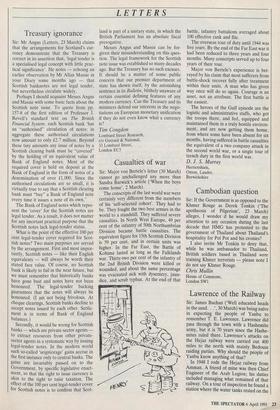LETTERS Treasury ignorance
Sir: Mr Angus (Letters, 23 March) claims that the arrangements for Scotland's cur- rency demonstrate that the Treasury is correct in its assertion that, 'legal tender is a specialised legal concept with little prac- tical significance'. He notes — echoing an earlier observation by Mr Allan Massie in your Diary some months ago — that Scottish banknotes are not legal tender, but nevertheless circulate widely.
Perhaps I should acquaint Messrs Angus and Massie with some basic facts about the Scottish note issue. To quote from pp. 157-8 of the first edition of Professor J. Revell's standard text on The British Financial System, each Scottish bank 'has an "authorised" circulation of notes: in aggregate these authorised circulations now amount to only £2.7 million. Beyond these tiny amounts any issue of notes by a Scottish clearing bank must be "covered" by the holding of an equivalent value of Bank of England notes. Most of the required cover is held on deposit at the Bank of England in the form of notes of a denomination of over £1,000. Since the authorised circulations are so small, it is virtually true to say that a Scottish clearing bank must "buy" a Bank of England note every time it issues a note of its own.'
The Bank of England notes which repre- sent the 'cover' for the Scottish notes are legal tender. As a result, it does not matter for any imortant practical purpose that the Scottish notes lack legal-tender status.
What is the point of the effective 100 per cent legal-tender cover required for Scot- tish notes? Two main purposes are served by the arrangement. First and most impor- tantly, Scottish notes — like their English equivalents — will always be worth their stated face value. Of course, no Scottish bank is likely to fail in the near future, but we must remember that historically banks have gone bust and notes have not been honoured. The legal-tender backing guarantees that the notes will always be honoured. (I am not being frivolous. At cheque clearings, Scottish banks decline to accept notes issued by each other. Settle- ment is in terms of Bank of England balances.) Secondly, it would be wrong for Scottish banks — which are private-sector agents to extract resources from other private- sector agents in a systematic way by issuing legal-tender notes. In the modern world such so-called `seigniorage' gains accrue in the first instance only to central banks. The gains are invariably passed on to the Government, by specific legislative enact- ment, so that the right to issue currency is akin to the right to raise taxation. The effect of the 100 per cent legal-tender cover for Scottish notes is to confirm that Scot- land is part of a unitary state, in which the British Parliament has an absolute fiscal prerogative.
Messrs Angus and Massie can be for- given their misunderstanding on this ques- tion. The legal framework for the Scottish note issue was established so many decades ago. But the Treasury has no such excuses. It should be a matter of some public concern that our premier department of state has shown itself, by the astonishing sentence in its Bulletin, blithely unaware of certain essential defining features of any modern currency. Can the Treasury and its ministers defend our interests in the nego- tiations on European monetary unification if they do not even know what a currency is?
Tim Congdon
Lombard Street Research, do Gerrard & National, 33 Lombard Street, London EC3


















































 Previous page
Previous page